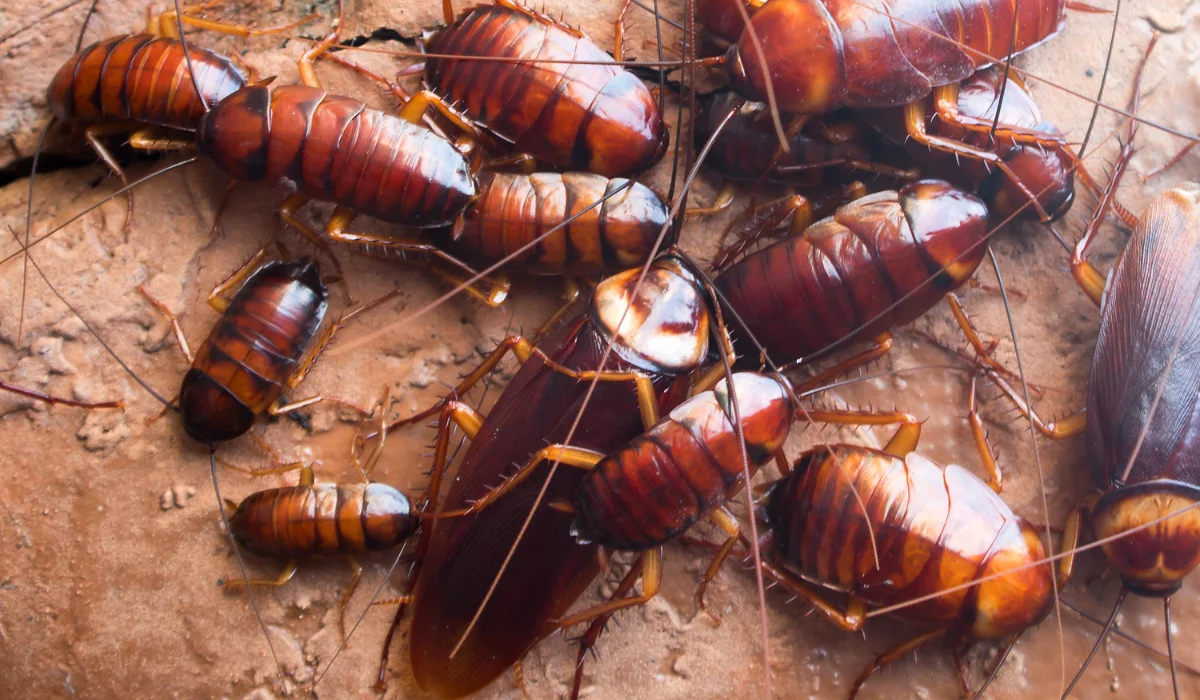
In Alabama, September brings heat, heavy rain, and sticky air. While nights feel cooler, roaches use this time to multiply and move indoors. From Birmingham to Huntsville, homeowners see more roach activity as summer shifts to fall.
Damp spots, leaky faucets, pet food bowls, and warm basements draw pests to your home. Roaches squeeze through tiny gaps and quickly become a problem. For Alabama homeowners, it’s often the month when a few roaches turn into a full infestation.
If you’re seeing more roaches this September, you’re not alone. Knowing why they thrive in this weather can help you take steps to protect your home.
This guide covers why Alabama’s September humidity boosts roach activity, which species you’ll see, signs to watch for, how they get inside, health risks, and proven ways to get rid of cockroaches. You’ll also learn how ongoing professional pest control protects your home year-round.
Key Takeaways:
- Roaches in Alabama peak in September because of high humidity and lingering summer heat.
- German cockroaches, American cockroaches, and other species spread quickly indoors once they find food and water sources.
- Infestations spread bacteria like Salmonella and E. coli, which can make people sick.
- Professional pest control services are the most effective way to eliminate cockroaches and prevent future infestations.
Why Roaches Thrive in Alabama’s September Humidity
Roaches live in Alabama year-round, but September creates the perfect storm for them to spread. High humidity and lingering summer heat keep crawl spaces, basements, and attics damp. Leaky faucets, clogged gutters, and wet mulch provide steady moisture. With food nearby, roaches breed faster and stay active longer into the fall.
Common Types of Cockroaches in Alabama
Several cockroach species cause problems across Alabama homes:
- German cockroaches: The most common indoor species. They spread fast, often nesting in kitchens, near sinks, and by pet food.
- American cockroaches (palmetto bugs): Larger and usually outdoors, but move inside through crawl spaces, sewers, and mulch beds.
- Oriental cockroaches: Dark and shiny, found in damp basements and other wet areas.
- Asian cockroaches: Resemble German cockroaches but fly toward lights, often gathering around porches and patios.
Signs of A Cockroach Problem
Seeing one roach doesn’t always mean an infestation, but ignoring early signs can lead to bigger problems. Watch for these warning signs:
- Droppings: Small, dark specks often found near cabinets, food storage, or baseboards.
- Musty smell: Large infestations give off a strong, unpleasant odor.
- Grease marks: Smudges along walls or near entry points.
- Roaches in the daytime: Since they usually hide, seeing them in daylight often indicates a large infestation.
German cockroaches reproduce fast. One egg case can hatch dozens of nymphs. By September, warm, damp weather helps them spread even quicker.
How Roaches Enter Alabama Homes
Roaches sneak inside with ease. They use small cracks around doors, windows, and utility lines. In older homes in Birmingham and Huntsville, foundation gaps and loose crawl-space covers make it even easier for them to get in.
Roaches also hitch rides in grocery bags, cardboard boxes, and used furniture. Once indoors, they settle near food and water. If you don’t act early, a minor issue can become a major infestation.
Seal entry points as a first step in cockroach control. If roaches are already inside, call a professional to remove them.
Health Risks From Cockroach Infestations
Roaches are more than a nuisance. They carry pathogens like Salmonella and E. coli and spread them to food and kitchen surfaces. These bacteria can cause stomach illness, food poisoning, and salmonellosis.
Cockroach droppings and shed skins trigger allergies and asthma, especially in children. For families with health concerns, even a small infestation can be dangerous.
American cockroaches often move between sewers and kitchens and spread germs, while German cockroaches contaminate food storage areas. Act quickly to eliminate cockroaches.
How To Get Rid Of Cockroaches In Alabama
Getting rid of roaches takes more than store-bought sprays. German cockroaches require an insect growth regulator (IGR) to stop them from reproducing. American and Oriental cockroaches respond well to liquid or granular treatments, especially near crawl spaces and mulch beds.
Cleaning plays a significant role. Keep food sealed, wash dishes daily, fix leaking faucets, store pet food properly, and keep basements and attics dry.
Even with good sanitation, most infestations still need professional cockroach control.
Roaches, termites, and year-round pest control
While roaches get worse in September, Alabama homeowners face other pests year-round. Termite activity is a constant concern in this region. Like roaches, termites thrive in warm, damp conditions and can cause severe damage if ignored.
Many homeowners in Huntsville, Tuscaloosa, and Auburn choose ongoing pest control plans that cover roaches and termites. Regular service protects homes before infestations grow.
Making the right pest control choice for Alabama homeowners
September’s damp air means roaches aren’t slowing down anytime soon. They continue to move through walls, hide in storage areas, and multiply in places you may not check every day. Left untreated, their numbers grow fast, and they’re harder to remove on your own.
Magic City Pest Control offers treatments built for Alabama homes and designed to stop infestations before they spread further.
Contact us today or request a free quote and schedule your professional roach treatment.
FAQs
Why are roaches worse in September in Alabama?
September’s heat and humidity push roaches indoors. Damp crawl spaces, basements, and leaky faucets provide them with water and access to food, allowing them to multiply quickly.
What types of cockroaches are common in Alabama homes?
German, American, Oriental, and Asian cockroaches are most common. Each thrives in different places, from kitchens to sewers.
How can I prevent a cockroach infestation?
Seal entry points, clean up food, fix leaks, and reduce wet mulch around your foundation. For long-term protection, schedule pest control with a local exterminator.





